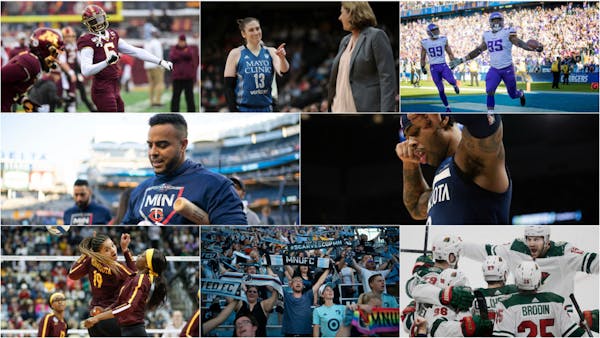Josh Okogie can't help but replay the situation in his mind and analyze all the ways in which George Floyd could still be alive.
The 21-year-old Timberwolves guard also can't shake the way police treated Floyd compared to the way police treated Dylann Roof, a white supremacist who was sentenced to death for murdering nine black people in a South Carolina church in 2015.
"He goes into a Baptist church and mass murders all these people. The cops come. They put a bulletproof vest on him, nobody harms him. Feed him Burger King," Okogie said. "So a guy who did a crime harsh enough to get the death sentence, you give him a bulletproof vest and you feed him Burger King?
"And you got a guy like George Floyd … he has four cops on him. One guy has his knee to his neck and he's crying for help."
It underscored Okogie's main message he wants people to know: "We're never safe. We never have a fair playing field."
Professional sports can sometimes try to stifle the views of its players in the name of not wanting to cause the dreaded D word — distraction.
But in recent years, the NBA has been a place where players can express themselves, especially as it pertains to issues of race that affect them every day, and Okogie and teammates haven't been shy about sharing their thoughts and emotions on social media.
“It doesn't matter where you are or what you do, you can always be a victim of racism”
Okogie, who lives downtown, was on hand as former NBA player Stephen Jackson spoke at a rally Friday in honor of Floyd. Okogie said he could see why some people lashed out in anger over the course of the last week.
"I hear our cries and it's just hard because as I don't condone violence, at the same time, you can't push people to the wall and expect them not to fight back," Okogie said. "I think that's just a display of what we're seeing right now."
Joining Okogie at the rally was Wolves teammate Karl-Anthony Towns, who showed up even as he deals with his own personal grief in the wake of his mother Jacqueline's death to COVID-19.
"He's obviously in a tough situation right now, dealing with a lot of stuff, and to show up to something like this shows you he's about more than just himself," Okogie said.
Added coach Ryan Saunders: "Karl has endured a lot — a lot. For him to speak up and stand up and be a leader while he's grieving in his own way, it just tells you a lot about his character, who he is as a person. … Karl's strength is something we can all take something from."
In staff memo, NBA commissioner addresses racial tensions
Through virtual chats, the Wolves have encouraged dialogue among their players and staff. President Gersson Rosas set up a talk between the team and Tru Pettigrew, a public speaker who helps connect communities with police.
Saunders said it was his responsibility during this time to "be more of a listener."
"I want to learn more and learn how I can stand and be an ally with all these individuals because enough is enough," Saunders said. "Stand with our brothers and sisters who may not look like us, stand with our brothers and sisters as human beings. Understanding that what's right is right and what's wrong is wrong and treating somebody different because of the way they look that should not be the judgment on that person. It's wrong.
"It's very sad that it's come to this and this is where conversations have had to start now."
Saunders said he had a conversation this week with a friend of his who is black and the friend gave Saunders a slice of what it's like to be black in America. The friend told Saunders he feels he has to dress a certain way when he walks out of his job or residence or else he is putting himself at a greater risk of harassment.
"He feels he needs to present himself a certain way, which to me is so unbelievably sad that some people may feel that way at times," Saunders said. "It's just crushing. So, it just crushes me."
The Wolves have been sharing those emotions as events unfold. Saunders said it "hurts" to see the destruction taking place in the state in which he grew up.
"I've felt compelled to speak out and not be silent because George Floyd should still be alive," Saunders said. "People in Minnesota are rightfully livid. They're speaking out and hey, if our family and friends who are in the minority weren't murdered, there wouldn't be riots. So you wish that was not occurring. But everybody deals with things in different ways."
Okogie said Floyd's death was another example of just how vulnerable black people are — regardless of whether they're in the NBA or not.
"It doesn't matter where you are or what you do, you can always be a victim of racism," Okogie said.





![Naz Reid (11) of the Minnesota Timberwolves Wednesday, March 27, 2024, at Target Center in Minneapolis, Minn. ] CARLOS GONZALEZ • carlos.gonzalez@](https://arc.stimg.co/startribunemedia/TGYNEKQCYNH5VEPCXSJODRMDDM.jpg?w=75&h=75&fit=crop&crop=faces)

